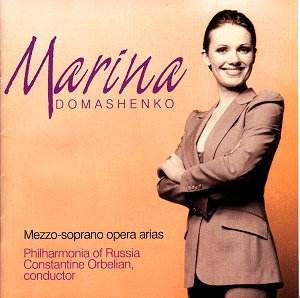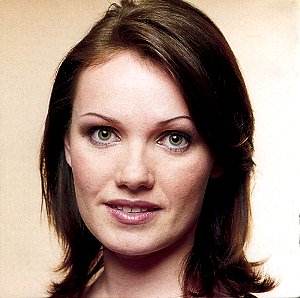The Siberian mezzo-soprano Marina Domashenko is (or
was when the booklet notes were written earlier this year) 27. She made
her European début in 1998 in Prague, and since then has chalked
up theatre appearances in San Francisco (alongside Domingo), Paris,
Bologna, Amsterdam, Athens, Venice, Vienna (and, shortly to come, Berlin),
as well as concert appearances in London and New York.
She impresses here as a real dramatic mezzo-soprano,
with enough heft for "Stride la vampa" but also with plenty
of agility for the Rossini piece. Her voice is even and well-produced,
with a rich sheen which accompanies it right through its range up to
a fine high B. I hope that she will not put extra pressure on her vibrato,
which might then flay out and undermine the good work, but as it is
it is natural and attractive.
Having found the voice a fine one and a well-schooled
one, I might only add that she is a very musical singer and conclude
that she has all the requisites to become a major presence in our theatres
over the next couple of decades.
I believe this is so, but it would be too much to expect
at this early stage the sort of spot-on insights into particular words
that some of the greatest singers of the past could give. Take the first
Samson aria (the well-known one). When Callas sings "mon
bien-aimée" we somehow know that this is a woman whose love
is so pathologically obsessive that she is prepared to do great harm
to the man she loves to keep him enchained to her. Domashenko just sings
it. You might, though, find her voice more inherently suited to the
music (it is a mezzo role and Callas was not a mezzo). Her Carmen is
less mannered than Callas’s, but lacks a profile of its own as yet.
The hiccups of Orlofsky’s aria are neatly negotiated without quite sounding
really tipsy. The slower pieces, notably the Prokofiev, allow us to
savour her gorgeous timbre.
The raw material is great, then; much will depend on
the conductors, producers and other musicians she comes into contact
with. Some readers might wonder how she compares with another great
talent to have emerged recently from the other side of the former Iron
Curtain, Vesselina Kasarova. Kasarova has a more tangible personality,
but is another type of mezzo, a smaller voice well-suited to Donizetti
and the French repertoire but unlikely to branch into Azucena. Kasarova
has also proved to be a fine lieder recitalist. Domashenko is more a
"normal" operatic mezzo and may be for the next generation
what Barbieri and Simionato were for the last. Which is saying something.
I shall certainly look forward to her first complete opera on CD.
Christopher Howell


 Marina Domashenko (mezzo-soprano), Philharmonia
of Russia/Constantine Orbelian
Marina Domashenko (mezzo-soprano), Philharmonia
of Russia/Constantine Orbelian